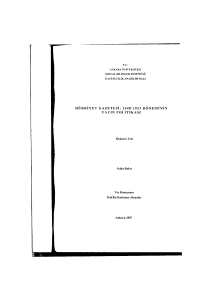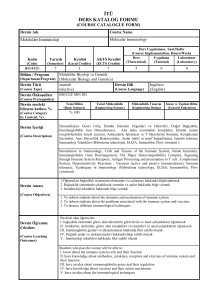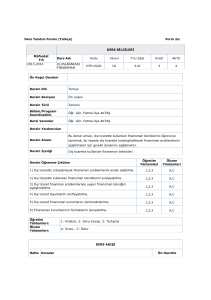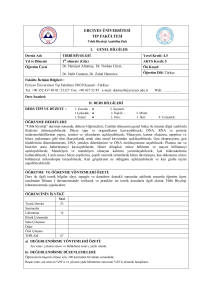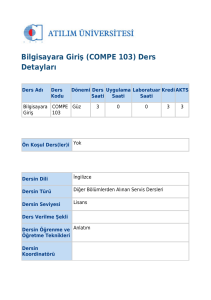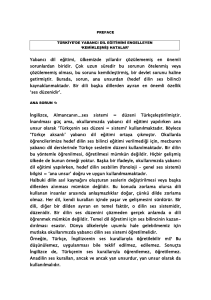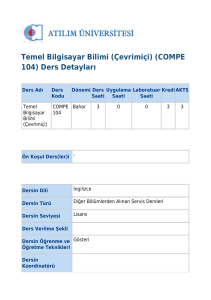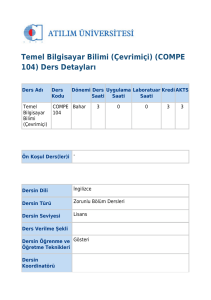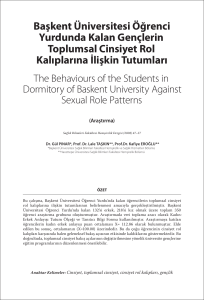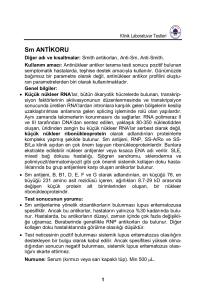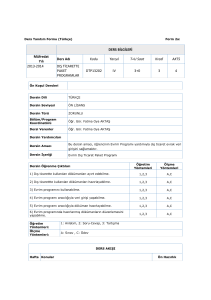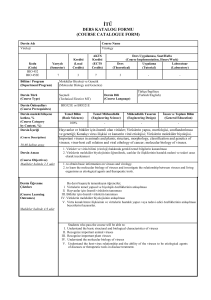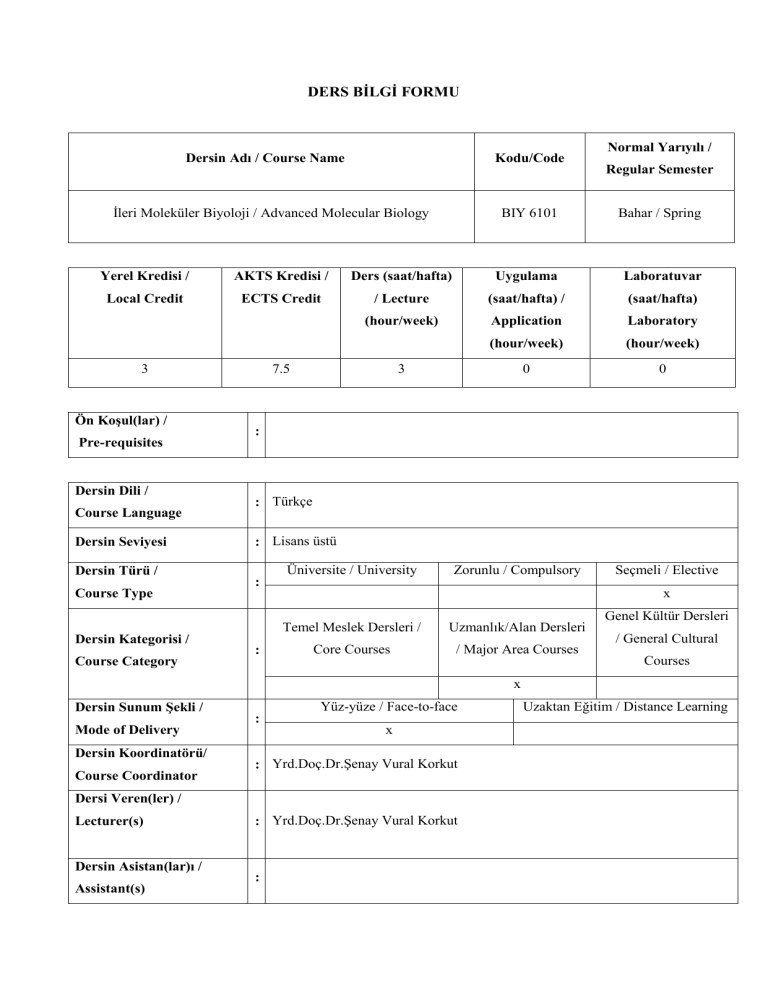
DERS BİLGİ FORMU
Dersin Adı / Course Name
Kodu/Code
İleri Moleküler Biyoloji / Advanced Molecular Biology
Normal Yarıyılı /
Regular Semester
BIY 6101
Bahar / Spring
Yerel Kredisi /
AKTS Kredisi /
Ders (saat/hafta)
Uygulama
Laboratuvar
Local Credit
ECTS Credit
/ Lecture
(saat/hafta) /
(saat/hafta)
(hour/week)
Application
Laboratory
(hour/week)
(hour/week)
0
0
3
Ön Koşul(lar) /
Pre-requisites
Dersin Dili /
Course Language
Dersin Seviyesi
Dersin Türü /
Course Type
Dersin Kategorisi /
Course Category
7.5
3
:
: Türkçe
: Lisans üstü
Üniversite / University
Zorunlu / Compulsory
:
:
Seçmeli / Elective
x
Temel Meslek Dersleri /
Uzmanlık/Alan Dersleri
Core Courses
/ Major Area Courses
Genel Kültür Dersleri
/ General Cultural
Courses
x
Dersin Sunum Şekli /
Mode of Delivery
Dersin Koordinatörü/
Course Coordinator
Yüz-yüze / Face-to-face
:
x
: Yrd.Doç.Dr.Şenay Vural Korkut
Dersi Veren(ler) /
Lecturer(s)
Dersin Asistan(lar)ı /
Assistant(s)
: Yrd.Doç.Dr.Şenay Vural Korkut
:
Uzaktan Eğitim / Distance Learning
Dersin Amacı /
Course Objective
Dersin İçeriği /
Course Content
Dersin amacı öğrencilere kalıtım materyalinin yapısı, işlevi, replikasyon ve
onarımı ile protein yapı ve fonksiyonu, transkripsiyon,ve translasyon
: konularında detaylı bir şekilde bilgi vermektir . / The aim of the course is to
give students detailed information on the structure and function of the genetic
material and proteins, DNA replication and repair mechanisms, transcription
and translation
Giriş, Nükleik Asitler: DNA ve RNA yapı ve fonksiyonları DNAnın farklı
Formları, Kromozom Yapısı , DNA Replikasyonu, DNA Tamiri, Proteinlerin
Yapı ve Fonksiyonları, Transkripsiyon, RNA işlenmesi, Genetik Kod,
Translasyon, Translasyon Sonrası Modifikasyonlar Moleküler Biyolojide
Kullanılan deneysel Yöntemler / Introduction, Structure and functions of
: Nucleic Acids: Nucleotides, Different Forms of DNA, structure of
Chromosomes, DNA replication, DNA Repair, Structure and Functions of
Proteins, Amino Acids, Polypeptides, Primary, Secondary, Tertiary, Quaternary
structures of Proteins, Types of Proteins, Transcription, RNA splicing, Genetic
Kod, Translation, Posttranslational Modifications, Experimental Methods used
in Molecular Biology
Dersin sonunda öğrenciler
Dersin Öğrenme Çıktıları /
Course Learning
Outcomes
DNA ve RNAnın yapısını ve kimyasını ile fonksiyonları, nispi
stabiliteleri ve proteinlerle etkileşimleri arasında nasıl bağlantı
olduğunu açıklayabilirler
DNAnın bileşenlerinin yapısını , farklı DNA formlarını (A,B,Z). DNA
yapısı ve hasar tipleri arasında bağlantı kurabilirler
DNA replikasyon, tamir ve rekombinasyonu karşılaştırıp aralarında
bağlantı kurabilirler
Transkripsiyon, gen regülasyonu, RNA işlenmesi, ve translasyonun
mekanizmasını bilirler
Moleküler bilgilerini HIV retrovirüs ve insan hastalık durumlarının
altında yatan bozuklukları gibi kompleks mekanizmaları anlamak ve bu
konuda hipotez oluşturmak için kullanabilirler.
Gel shift, Nuclear Run on Ölçümleri, Promotor Linker tarama, analizi
gibi standard moleküler tekniklerin kullanıldığı deney sonuçlarını
yorumlayabilirler ve klasik deneylerin DNA replikasyonunu,
rekombinasyonunu, transkripsiyonu ve gen regulasyonunu anlamada
nasıl kullanılacağını açıklayabilirler.
:
At the end of course students should be able to
Explain how the structure and chemistry of DNA and RNA relate to
their functions, their relative stability, and their interactions with
proteins.
Know the complete structures of DNA components, the different forms
of DNA (A, B, Z). Relate DNA structure to forms of DNA damage.
Compare & contrast mechanisms of DNA replication, repair,
recombination,
Know mechanisms of transcription, gene regulation, RNA processing
and translation in bacteria & eukaryotes
Apply molecular knowledge to understand and hypothesize about
specific complex systems such as the HIV retrovirus and human disease
states with underlying molecular dysfunction
Interpret the results of experiments using standard molecular techniques
such as gel shift, transcription run-on assay, linker scanning promoter
analysis and explain how classic experiments have led to our current
understandings about DNA replication, recombination, transcription,
gene regulation,
KAYNAKLAR / SOURCES
Ders Kitabı / Textbook
Diğer Kaynaklar /
Other Sources
1. LEVIN’S GENES X, , Jocelyn E. Krebs, Elliott S. Goldstein, Stephen T.
Kilpatrick , Jones and Bartlett 2011
: 2..Molecular Biology of the Cell, Bruce Alberts, Alexander Johnson, Julian
Lewis, Martin Raff, Keith Roberts, Peter Walter Garland Science, Sinauer
Associates Inc, Sunderland, 2002.
: İlgili araştırma yayınları/ Related research papers
HAFTALIK KONULAR VE İLGİLİ ÖN HAZIRLIK ÇALIŞMALARI
Hafta /
Konular / Subjects
Week
Preparation
1
Giriş
2
Nükleik Asid Yapı ve Fonksiyonları: Nükleotidler / Structure and
functions of Nucleic Acids: Nucleotides
Nükleik Asid Yapı ve Fonksiyonları: DNA yapısı ve Farklı DNA
formları / Structure and Functions of Nucleic Acids: DNA structure,
Different Forms of DNA
RNA yapı ve çeşitleri / RNA Structure and Forms
3
4
7
Genom İçeriği ve Genlerin yapısı / Content of the Genome and gene
structure
Kromatin ve Kromozom Yapısı / Chromatin and Chromosomal
Structure
DNA Replikasyonu / DNA replication
8
Mid term Exam
9
DNA Rekombinasyonu ve Tamiri / DNA Recombination and Repair
10
11
Proteinlerin Yapı ve Fonksiyonları: Birincil, İkincil, Üçüncül ve
Dördüncül Protein Yapıları / Structure and Functions of Proteins,
Amino Acids, Polypeptides, Primary, Secondary, Tertiary, Quaternary
structures of Proteins Protein çeşitleri / Types of Proteins
Prokaryotlarda Transkripsiyon / Transcription in Prokaryotes
12
Eukaryotlarda Transkripsiyon / Transcription in Eukaryotes
13
RNA İşlenmesi ve modifikasyonları / RNA Splicing and Modifications
14
Genetik Kod and Translasyon
15
Moleküler Biyolojide Kullanılan Deneysel Yöntemler / Experimental
Methods used in Molecular Biology
5
6
Ön Hazırlık / Related
Ders Kitabı 1,Bölüm1
/Textbook 1,Chapter 1
Ders Kitabı 1,Bölüm1
/Textbook 1,Chapter
Ders Kitabı 1,Bölüm1
/Textbook 1,Chapter
Ders Kitabı 1,Bölüm1
/Textbook 1,Chapter
Ders Kitabı 1,Bölüm 4-5
/Textbook 1,Chapter 4-5
Ders Kitabı 1,Bölüm9-10
/Textbook 1,Chapter 9-10
Ders Kitabı 1,Bölüm11-14
/Textbook 1,Chapter 11-14
Ders Kitabı 1,Bölüm15-16
/Textbook 1,Chapter 15-16
Ders Kitabı 2,Bölüm
/Textbook 2,Chapter
Ders Kitabı 1,Bölüm19
/Textbook 1,Chapter 19
Ders Kitabı 1,Bölüm20
/Textbook 1,Chapter 20
Ders Kitabı 1,Bölüm21
/Textbook 1,Chapter 21
Ders Kitabı 1,Bölüm25
/Textbook 1,Chapter 25
Ders Kitabı 1,Bölüm 3
/Textbook 1,Chapter 3
16.
Final exam / Final sınavı
DEĞERLENDİRME SİSTEMİ / EVALUATION SYSTEM
Yarıyıl İçi Çalışmaları / In-Term Studies
Devam / Attendance
Laboratuar / Lab
Uygulama / Application
Arazi Çalışması / Field Work
Derse Özgü Staj / Special Course Internship
Ödev / Homework Assignments
Sunum / Presentations
Projeler / Project
Seminer / Seminar
Ara sınavlar / Mid-Terms
Final / Final
Sayısı /
Number
Katkı Payı /
Percentage of Grade
2
1
20
10
1
1
TOPLAM / TOTAL
Yarıyıl İçi Çalışmaların Başarı Notuna Katkısı /
Percentage of In-Term Studies
Yarıyıl Sonu Sınavının Başarı Notuna Katkısı /
Percentage of Final Examination
30
40
100
60
TOPLAM/TOTAL
100
40
DERSİN ÖĞRENİM ÇIKTILARININ PROGRAM YETERLİLİKLERİ İLE İLİŞKİSİ
/ THE RELATIONSHIP BETWEEN COURSE LEARNING OUTCOMES AND
PROGRAM COMPETENCIES
No
1
2
Program Yeterlikleri/Çıktıları
Program Competencies/Outcomes
Lisans düzeyinde elde etmiş oldukları temel bilgi ve
becerilere dayalı olarak moleküler biyoloji ve genetik
alanında uzmanlık düzeyinde bilgi sahibi olur ve kendi
araştırma alanlarına göre ileri bilgileri elde etme
yeteneği kazanır.
Students can acquire complex knowledge and expertise
based on basic knowledge and skills that they have
obtained during their undergraduate education and
develop ability to acquire further knowledge according
to their own research interest
Öğrenciler moleküler biyoloji ve genetik lisansüstü
1
*Katkı Düzeyi
*Level of Contribution
2
3
4
5
x
x
3
4
5
6
7
8
9
derslerinden edindikleri bilgi ve becerileri entegre
edebilir ve kendi araştırma alanlarına uygulayabilirler.
Students can integrate knowledge and skills from
molecular biology and genetics courses and apply to
their own research areas
Öğrenciler moleküler biyoloji, genetik ve biyoteknoloji
ve ilgili alanlarda özgün teknik becerileri geliştirir ve
laboratuarda bağımsız olarak çalışabilme yeteneği
kazanır.
Students acquire specific technical skills in molecular
biology, genetics, biotechnology and related disciplines.
and gain ability to conduct independent work in
laboratory.
Öğrenciler konularındaki bilimsel literatürü takip
edebilme, okuma ve eleştirel olarak anlama yetenegi
kazanır.
Students gain ability to search and read scientific
articles, gain a critical understanding of their contents.
Öğrenciler bilimsel verileri analiz etmek ve bilgi
edinmek için bilgisayar teknolojilerini kullanabilir.
Students can use computational technologies to analyse
scientific data and for information retrieval.
Öğrenciler bilimsel bilgi, fikir ve kendi araştırma
çktılarını yazılı ve sözlü olarak aktarma yeteneği
kazanır.
Students develop skills of written and oral
communucation of scientific information, ideas and
their own research outputs.
Öğrenciler kuramsal ve uygulamalı araştırmalarla ilgili
moleküler biyoloji, genetik ve biyoteknoloji
konularında kavramsal bilgi ve kritik düşünme
yetenekleri geliştirebilir, hipotez tasarlayıp test edebilir.
Students develop conceptual knowledge and critical
thinking, hypothesis design and testing on molecular
biology, genetics and biotechnology themes related to
theoretical and applied research.
Öğrenciler –omik ve rekombinant DNA teknolojilerinin
avantajlarını, sınırlarını ve bunların problem
çözümlemede nasıl kullanılacağını anlar.
Students demonstrate understanding of advantages and
limitations of –omics (genomics, proteomics,
metabolomics) and recombinant DNA technologies and
how are used for problem solving approaches.
Öğrenciler
moleküler
biyoloji,
genetik
ve
biyoteknolojinin gelişen uygulamaları için fikir sahibidir
ve konularının toplumla ilişkisi konusunda bilinçlidir.
Students have informed interest in the growing
application of molecular biology, genetics and
biotechnology and develop awareness of the relevance
of their subject to society.
x
x
x
x
x
x
x
Öğrenciler gelecekteki iş olanakları için problem çözme
ve takım çalışması konusunda uygun mesleki becerileri
kazanır.
10
Students acquire appropriate professional skills in
problem solving and team work for their future
employment opportunities.
Bilimsel çalışmalarının tüm aşamalarında uluslararası
kabul görmüş bilimsel ve etik değerlere uygun hareket
edebilir.
11
Students gain ability to act according to internationally
accepted ethical rules on all levels of their scientific
work.
Öğrenciler kalite yönetimi ve süreçleri ile çevre koruma,
iş sağlığı ve güvenliği konularında yeterli bilince sahip
olur.
12
Students would have conciousness on subjects such as
the quality management, worker welfare and safety.
*1 en düşük, 2 düşük, 3 orta, 4 yüksek, 5 en yüksek
*1 Lowest, 2 Low, 3 Average, 4 High, 5 Highest
x
x
x
AKTS İŞ YÜKÜ TABLOSU / ECTS WORKLOAD TABLE
Etkinlikler / Activities
Sayısı
Süresi
(Saat)
Ders Süresi (Sınav haftası dahildir: 16x toplam ders saati)/
14
3
Course hours
Laboratuar/ Lab
Uygulama/ Application
Derse Özgü Staj(varsa)/ Special Course Internship
Arazi Çalışması/ Field Work
Sınıf Dışı Ders Çalışma Süresi (Ön çalışma, pekiştirme)/
14
6
Study hours out of class
Sunum / Seminer Hazırlama/ Presentations/ Seminar
1
8
Proje/ Project
Ödevler/ Homework Assignments
2
10
Ara sınavlar/ Mid-Terms
1
30
Yarıyıl Sonu Sınavı/Final Examination
1
40
Toplam İş Yükü / Total Workload
Toplam İş Yükü / 30 (s) / Total Workload / 30(h)
AKTS Kredisi / ECTS Credit
Toplam
İş Yükü
42
84
8
20
30
40
224
7.46
7.5

